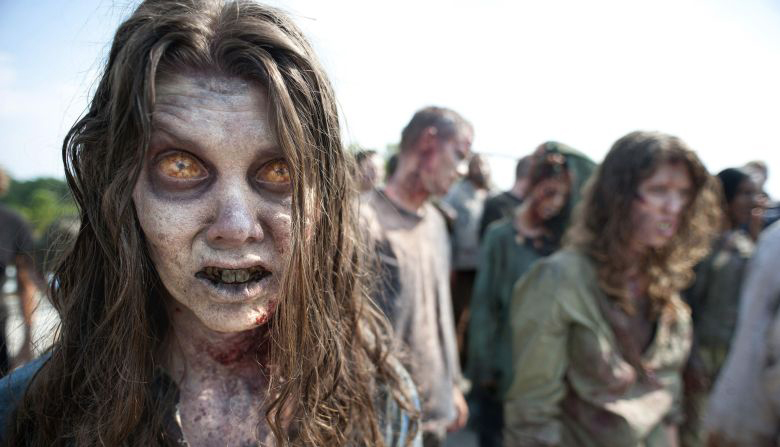
What are we to make of our obsession with zombies? If one considers mass media as a window into our collective human consciousness, then the mass-media outbreak of zombies represents the expression of a symbolic neurosis emerging from modern society as whole.
Human society in the west has variously exploded and imploded as the effects of communications technology have reached ever deeper into the day-to-day life of ordinary people. The explosion phase began perhaps 500 years ago as information technology jumped into reproducible books and fomented the enlightenment in Europe. Simultaneous with that came the introduction of perspective in painting and drawing, the presentation of an individual “point of view” within the depiction of a scene. The advance of time-keeping and standardized units of time was another coincident event. These factors produced an explosion of individualism which resulted in the transformation of society.
Roughly 100 years ago, a further shift in technology produced electronic communication, the telegraph and telephone, which essentially eliminated time and space as limiting factors in the dispersal of information. As this progressed towards our present digital age, both the depth of information, what we can call its “definition resolution,” increased as did the access to it. We can describe this in McLuhanesque terms as the technological extension of our senses by electronic means. Herein we find the implosion phase of society; our extended sensory apparatus has highlighted our awareness of interconnectedness, and some would say has overwhelmed us. The world is moving towards deepened engagement with globalized tribal states and away from the individuality of nation states.
The first contemporary zombie movies presaged this tribal shift, albeit in the form of the living dead collectively craving human flesh. The zombies seem to have “one mind” and have lost all individuality. Setting aside their unusual dietary preference, it is their overt, unified tribal behavior that stands in sharp relief against ordinary human beings. In one sense, zombies are beings who have become numb to their humanity, the feelings of the living, or seemingly anything at all. Psychologically, zombies are people who have become so completely overwhelmed they are stumbling through life trapped in a waking nightmare.
Hard-wired to respond empathically to others, human beings have been placed in an untenable situation by the electronic and digital extension of our senses; we literally know too much, and are largely powerless to do much about all the horrors of the world. We are confronted daily by information about death, disease, violence, climate change, species extinction, earthquakes and so forth, mostly happening at a distance. But from an information standpoint, space and time no longer exist and our emotions are fully triggered nonetheless. It’s too much, and to get through each day we become numb.
Hence the rise of mass-media zombies, the societal-psychological outburst produced by numbness, and emotions buried, but only thinly. It’s not zombies that crawl up out of their burial ground but emotions. Hollywood and television zombies are a metaphoric reflection of our own contemporary dilemma; we are above all else feeling beings forced by an overload of information to bury our feelings, which then crawl out of our subconscious and threaten to devour us.
Thus an important societal truth is being told to us about the danger of numbness: we are afraid of zombies because we have all, in some way, become zombies.